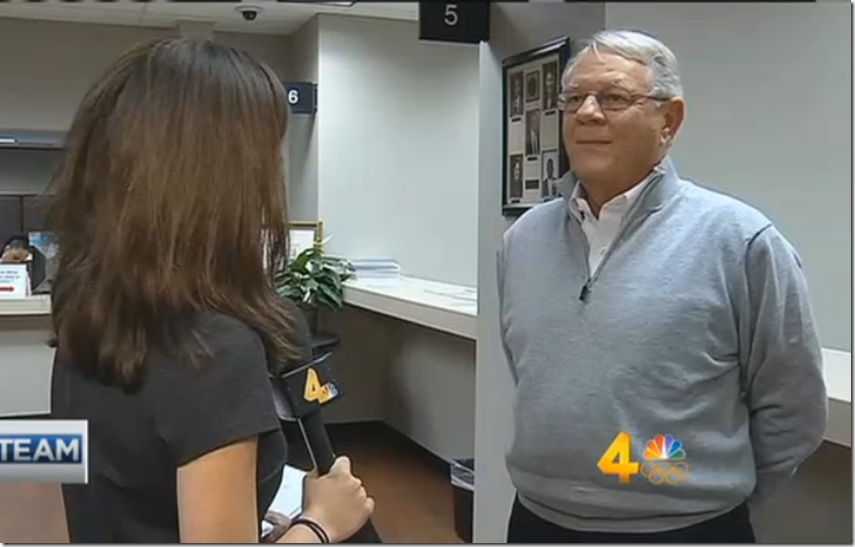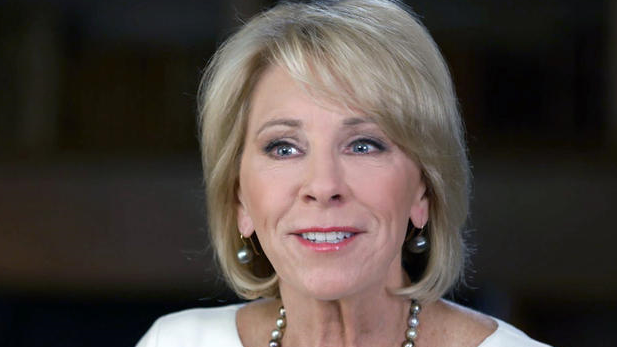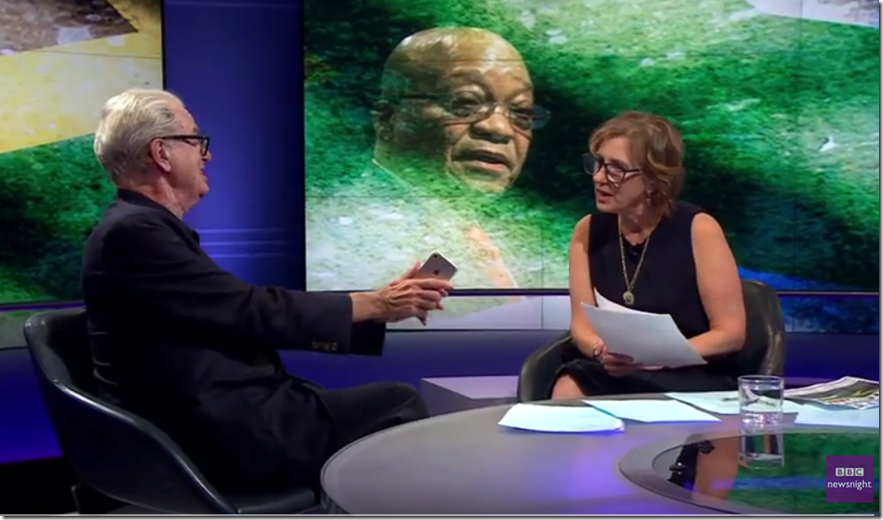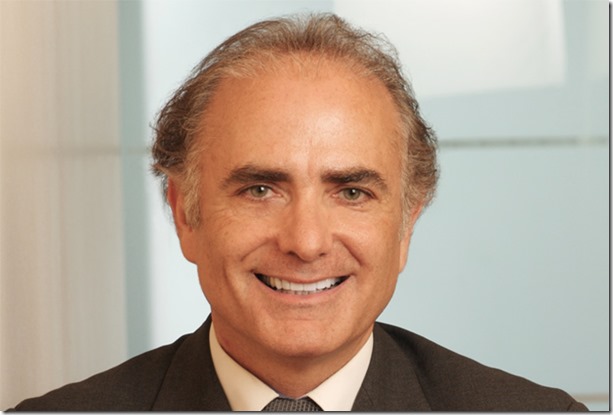Official Calls Reporter A "Bitch," Resigns, Then Does It Again
Ron Buchanan, Nashville’s top election official, resigned on Monday after calling a reporter from WSMV-TV a “bitch”—while tape was rolling.
Buchanan was answering questions about his expenses, which included meals at upscale local restaurants and pricey office furnishings. He was doing a fine enough job of defending his expenses as legitimate—but something got under his skin when the reporter asked him this question:
“Could you have gone to another restaurant that was perhaps not as expensive?”
Here the full exchange, as transcribed by WSMV:
“Could you have gone to another restaurant that was perhaps not as expensive?”
“That’s it,” Buchanan said, walking away from the camera.
“Can you explain the picture frame that was $614?” Autler asked.
“That’s it,” Buchanan said.
“That’s it?” Autler said.
“That’s exactly the kind of bitch I thought you would be,” Buchanan said.
“Wow, do you want to say that again Mr. Buchanan?” Autler asked.
“No,” Buchanan said.
Under normal circumstances, the story would have ended there; after calling the reporter a pejorative term, he resigned his post.
But Mr. Buchanan wasn’t done. In his resignation letter, he wrote:
“I am submitting my resignation because I became frustrated with a reporter who made an inappropriate comment directed at me personally following an interview. Her comment had nothing to do with expenditures by the Election Commission, which was the subject matter of the interview. In frustration, I made a personal comment back to her which accurately expressed my feelings about her at the time, and still accurately expresses my feeling.
There are some that may feel my description of her conduct was inappropriate. That is understandable, but it is certainly not uncommon. I would estimate 90% of adult men would have used the same term to describe the reporter’s conduct if they had been present, or a similar word would have been used by women to describe the conduct if it had been a male reporter.”
First, let’s be clear: the reporter was asking questions that were well within the norm of journalistic standards, and the vast majority of people who are asked such questions answer them without resorting to personal invective.
He’s right about one thing: In anger, many of us use language we later regret. It’s unfortunate, but it happens. I suspect most viewers who viewed this exchange would have been willing forgive his sexist and abusive words—if they were followed by a sincere apology.
Instead, Buchanan took that one word and turned the story into a much larger argument about the appropriateness of sexist language. Instead of apologizing and moving on, he dug in and argued that the vast majority of men, faced with a similar situation, would have done the same thing—which is an obviously ridiculous assertion.
All Buchanan accomplished with his defiant resignation letter was to make clear that his initial use of the term “bitch” was no misstep, but rather a sincere belief that he’s entitled to direct that term toward any woman he deems deserving of it. His lack of judgment on that count makes me wonder if there wasn’t something to his lack of judgment with his expenditures, as well.
Like the blog? Read the book! The Media Training Bible: 101 Things You Absolutely, Positively Need to Know Before Your Next Interview is available in paperback, for Kindle, and iPad.




How embarrassing to be asked that on live television. She clearly displayed her contempt for him. It was completely unprofessional of her and he could have handled this many other ways. This is another got ya journalism moment from a no-name journalist desperate for ratings. Personally I could handle her, but I can see why he got offended. I’m not sure how many people would agree to be interviewed by her after this display. I’d say both of there careers are over after this. What a waste. She got her 7+ mins of fame, was it worth it?
When Autler asked him “Wow, do you want to say that again Mr. Buchanan?” It becomes obvious that this was a set-up. It’s obvious that someone has been gunning for him for a quite a while. I guess this is what broke the camels back.
I think the best way to deal with gotcha journalism is to call it out on the spot. Question the questioners motives and do background research such as private investigation. Find out who there family is, where they live, what political party they affiliate with, where the money is flowing before agreeing to the interview
The media are incredibly biased, people love it when they are called out. If he fought this hard enough he could make the reporter look a fool, it’s really his choice. The balls in his court.
The battle of public opinion is lost when you stop fighting.
And media training people are vultures on carcasses. They call a fight before it’s concluded. Like you did calling out trump all those times. ‘m riding you off mr. media.
I’d debate you any day Brad. You seem to have terrible political judgement. You’re analysis is biased toward the political left. Not sure this is because you adapt to the political environment (democrat in the WH) or otherwise. I would appreciate if you could clarify your political beliefs.
Justin,
You said a lot there, and given the ad hominem nature of your comment (“vultures on carcasses”), I won’t respond to every point.
I will say this: a reporter’s job is occasionally to antagonize (and I thought her antagonism was relatively mild), and a public official’s job is to remember who their true audience is — the constituents they serve, not the reporter. As Sam Donaldson once said, “The questions don’t do the damage, only the answers do.” By making it personal, Mr. Buchanan only served to demonstrate that he lacked judgment — which became even clearer when he dug in in his letter of resignation. He lost his job as a result, and it was a result of his response, not her questions.
As for the soundness of my judgment, that’s for each reader to decide. As for Donald Trump, I haven’t written a story about his gaffes hurting him since the summer. It became clear to me months ago that he was immune to the usual rules of political gaffes, and I stopped writing about that topic months ago. I was slower than some pundits to that point than others, sure, but on the whole, I believe I was ahead of the curve.
I’m not interested in “debating” you. This blog is a reflection of my views and experiences, and my hope is to provide worthwhile analysis. If you don’t believe I’m a voice worth hearing, you’re obviously welcome to form such a judgment and, as you say, “ride me off.”
Best,
Brad
Hi Brad,
Thank you for your response. I am sorry if my tone offended you.
I am here to learn. I want to make it clear, I appreciate your blog and mostly enjoy your analysis.
I’ll get to the point this time. The only thing that irks me about your analysis is that you fail to account for the reflexive nature of the human communication and tend to forecast (as if you pick teams).
Kind Regards,
Justin
Great example on how not to conduct an interview. Thanks for sharing.
So, Brad, what should have been the response to this question? My client has been in those shoes before where a reporter asks exactly that type of question, “Couldn’t you have stayed at a cheaper hotel?” The client’s response was that by staying at the conference hotel, he maximized his time and saved cab fare. But the reporter continued the “no win” type of questioning, like “how often do you beat your wife?”
Thanks, Brad! Great blog!
Hi Laura,
Thanks for reading and for your kind words! Please see Jill’s comment (and my reply) for a few ideas about how to answer that question. You’re right — it’s often a “no win” line of questioning — but sometimes “not losing” is good enough to count as a win.
Best,
Brad
Great post! Thank you for sharing.
I work for a government entity, and wonder how do you think Buchanan might have responded to the initial question.
Should he have defended his choice of restaurant? “We were working non-stop on the budget and decided to go to Sperry’s, a restaurant in our community that provided a quiet setting where we could continue to work for two hours…”
Or should he have admitted that maybe a less costly place would have filled the need and bill just as well? “Sperry’s is a restaurant in our community that provided a quiet setting for us to continue our work on the budget, but you’re right, there are less expensive options that we should have explored–and will do so next time…”
Also, do you think the PR woman who was left at the scene of the interview should have said something on camera? “I apologize for the way this interview was handled and ended. We will be in touch by the end of today with a written statement. Should I email that to you directly?”
Can you also speak to tips on how to handle emotions in the heat of the moment? The interviewee, the reporter, the PR person were all clearly upset.
Thanks again for sharing your expertise!
Jill
Thanks!
Jill
Hi Jill,
Thank you for your comment!
You’re clearly a good communicator — the two suggested responses you provided are spot on.
A more charismatic public official might even be able to get a little cheeky and say, “I believe that what the public cares about most is that we plan for reliable and fair elections, not whether I ordered a $12 chicken salad and $2 iced tea while having lunch and discussing community business. I’ve never heard from a member of the community who felt that was excessive — but if anyone watching this thinks it is, I’d be happy to speak with them about their concerns if they call my office.” Such a statement makes the questioner look a bit ridiculous and puts the controversy into perspective. But I’d only recommend that with the right spokesperson in cases in which there truly wasn’t more fire where it appeared there was smoke.
In terms of how to handle emotions, I’d offer this: remember who your true audience is. In a tense moment like that, the audience still isn’t the reporter — it’s the people watching at home. The audience can sometimes size up a sensationalistic story rather well, but by losing his cool, Mr. Buchanan didn’t allow audience sympathy to flow his way. He should have remembered that the “win” is convincing viewers of his integrity, not the reporter.
Thanks again,
Brad
Wow, what an ugly outburst. If that’s how he treats women in public and on-camera, what about the staff that have to work with him when there are no cameras around?
I also wonder what the PR staffer was thinking, allowing this person to be interviewed when he was so clearly unable to articulate a reasonable case for the expenses. Although I’m not fond of issuing written statements (because they often appear as a way of ducking tough questions) I think that would have been most appropriate in this case.
But then again, the spokesperson was a woman, so perhaps he wasn’t prepared to take her advice.